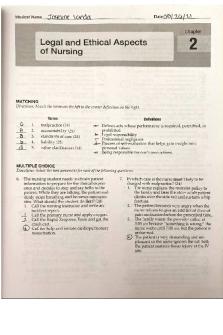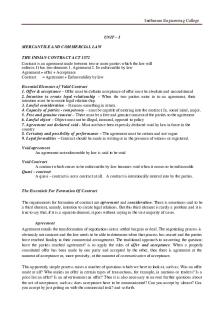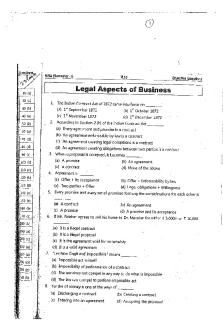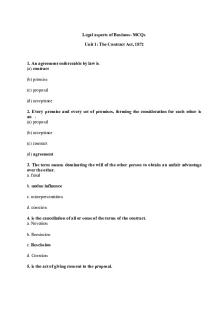Chapter 5 Policing, Legal Aspects PDF

| Title | Chapter 5 Policing, Legal Aspects |
|---|---|
| Author | Isabel Gregan |
| Course | Introduction To Criminal Justice |
| Institution | Colorado Mesa University |
| Pages | 4 |
| File Size | 101.9 KB |
| File Type | |
| Total Downloads | 103 |
| Total Views | 155 |
Summary
John Reece, personal notes from textbook....
Description
The Abuse of Police Power • •
National publicity of excessive use of power The rules by which the police are expected to operate are in constant flux
Individual Rights • •
The Constitution of the United States provides for a system of checks and balances among the three branches of government The courts are the arena for dispute resolution, not just between individuals, but between citizens and the agencies of government
A Changing Legal Climate •
Bill of Rights: o The popular name given to the first ten amendments to the U.S. Constitution, which are considered especially important in the processing of criminal defendants o The 1960s Warren Court rulings bound the police to strict procedural requirements in the areas of investigation, arrest, and interrogation o The new conservative court philosophy has reversed some of the Warren-era advances
Key Amendments to Criminal Justice • • • • • •
First Amendment Fourth Amendment Fifth Amendment Sixth Amendment Eighth Amendment Fourteenth Amendment
Constitutional Amendments of Significance to the Police Function •
Fourth and Fifth Amendments o The right to due process of law
Constitutional Amendments of Significance to the Police Function •
Fifth Amendment
o The right against self-incrimination o The right against “double jeopardy”
Constitutional Amendments of Significance to the Police Function •
Fourth Amendment o The right against unreasonable searches and seizures o The right against arrest without probable cause
The Fourth Amendment •
The right of the people to be secure in their persons, houses, papers, and effects, against unreasonable searches and seizures, shall not be violated, and no warrant shall issue, but upon probable cause, supported by oath or affirmation, and particularly describing the place to be searched, and the person(s) or things to be seized
The Exclusionary Rule •
• • •
Exclusionary rules refer to: o The understanding, based on U.S. Supreme Court precedent, threat incriminating material must be seized according to constitutional specifications of due process or it will not be allowed as evidence in a criminal trial The rule acts as a control over police behavior It specifically focuses on the failure of officers to obtain warrants Weeks v. U.S. (1914)
Tree Doctrine • •
Silverthorne Lumber Co. V. U.S. (1920) At trial any evidence later developed as a result of an illegal search or seizure
The Warren Court (1953-1969) • •
The 1960s were a time of youthful idealism Mapp v. Ohio (1961) made the exclusionary rule applicable to criminal prosecutions at the state level
Searches Incident to Arrest
•
•
•
What arresting officers may search o The defendant o The physical area within easy reach of the defendant Valid reasons for conducting a search o To protect the arresting officers o To prevent evidence from being destroyed o To keep the defendant from escaping When a search becomes illegal o When it goes beyond the defendant and the area within the defendant’s immediate control o When it is conducted for other than a valid reason
The Burger (1969-1986) and Rehnquist (1986-Present) Courts • •
Renewed concern with protecting the financial and other interests of those who live within the law Good faith exceptions refers to: o An exception to the exclusionary rule. Law enforcement officers who conduct a search or who seize evidence on the basis of good faith and who later discover that a mistake was made may still use the seized evidence in court
Exceptions to the Exclusionary Rule •
•
•
•
Probable cause refers to: o A set of facts and circumstances that would induce a reasonably intelligent and prudent person to believe that a particular other person has committed a specific crime Plain view doctrine refers to: o A legal term describing the ready visibility of objects that might be seized as evidence during a search by police in the absence of a search warrant specifying the seizure of those objects Emergency search refers to: o A search conducted by the police without a warrant, which is justified on the basis of some immediate and overriding need, such as public safety, the likely escape of a dangerous suspect, or the removal or destruction of evidence Also referred to as exigent circumstances
Other Exceptions to the Exclusionary Rule •
Authority to enter and/or search an “open field” without a warrant
• • • • •
Authority to search incident to an arrest and/or to conduct a protective sweep in conjunction with an in-home arrest Gathering of incriminating evidence during interrogation in noncustodial circumstances Stop and frisk/request personal identification Use of police informants in jail cells Warrantless naked-eye aerial observation of open areas and/or greenhouses
Suspect Rights: The Miranda Decision •
•
Miranda warnings refer to: o The advisement of rights due criminal suspects by the police before questioning begins Miranda v. Arizona (1966) o You have the right to remain silent o Anything you say can be used against you in a court of law o You have a right to speak to an attorney and have one present while you are being questioned o If you cannot afford an attorney, one will be appointed to represent you at no cost
Waiver of Miranda Rights by Suspects • • •
Suspects in police custody may legally waive their Miranda rights through a voluntary “knowing and intelligent” waiver Inevitable-discovery exception to Miranda Public-Safety Exception to Miranda...
Similar Free PDFs

Legal Aspects of Nursing
- 5 Pages

MCQ - Legal Aspects of Business
- 25 Pages

Legal Aspects of Business MCQs
- 26 Pages

Policing essay
- 8 Pages

Tema 5 medicina legal
- 4 Pages

Comparative models in policing
- 21 Pages

Seminar 2 community policing
- 2 Pages
Popular Institutions
- Tinajero National High School - Annex
- Politeknik Caltex Riau
- Yokohama City University
- SGT University
- University of Al-Qadisiyah
- Divine Word College of Vigan
- Techniek College Rotterdam
- Universidade de Santiago
- Universiti Teknologi MARA Cawangan Johor Kampus Pasir Gudang
- Poltekkes Kemenkes Yogyakarta
- Baguio City National High School
- Colegio san marcos
- preparatoria uno
- Centro de Bachillerato Tecnológico Industrial y de Servicios No. 107
- Dalian Maritime University
- Quang Trung Secondary School
- Colegio Tecnológico en Informática
- Corporación Regional de Educación Superior
- Grupo CEDVA
- Dar Al Uloom University
- Centro de Estudios Preuniversitarios de la Universidad Nacional de Ingeniería
- 上智大学
- Aakash International School, Nuna Majara
- San Felipe Neri Catholic School
- Kang Chiao International School - New Taipei City
- Misamis Occidental National High School
- Institución Educativa Escuela Normal Juan Ladrilleros
- Kolehiyo ng Pantukan
- Batanes State College
- Instituto Continental
- Sekolah Menengah Kejuruan Kesehatan Kaltara (Tarakan)
- Colegio de La Inmaculada Concepcion - Cebu








